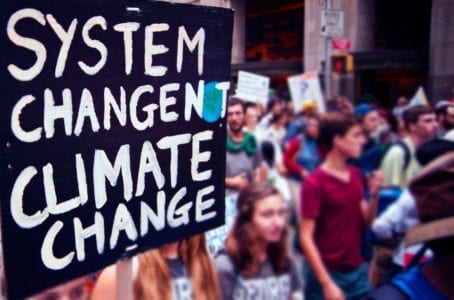Democratic Reform, Intergenerational Justice and the Challenges of the Long-Term
Prof Simon Caney, University of Warwick
CUSP essay series on the Morality of Sustainable Prosperity | No 11

Political life is dominated by ‘presentism’ and a focus on the short-term. This political myopia is harmful in two important ways. First, it leads governments to fail to discharge their duty to protect the long-term interests of current generations. Second, it results in governments’ failing to honour their responsibilities to future generations. Members of current and future generations are entitled to live in ecologically sustainable societies which realise their equal right to flourish. At present our political system is not well-designed to realise these ideals. In this Essay for CUSP, Simon Caney explores the nature of what he terms ‘Harmful Short-Termism’, and shows that it is pervasive in political life—contributing to environmental destruction and a failure to invest in the social, economic and structural preconditions of well-functioning societies. Simon argues that this short-termism stems from four separate factors. Together they result in a deep mismatch between, on the one hand, the timespan of many problems (such as climate change) and, on the other hand, the temporal horizons of citizens and politicians. He concludes by exploring what can be done to address these problems. Drawing on insights from Aristotle, de Tocqueville and Dewey, he outlines ways in which we can re-think and re-invigorate our political life so that we are better able to address Harmful Short-Termism. (To read the text with footnotes, please see the essay in PDF.)
Contemporary political life is dominated by the short term. Yet the actions that our governments take have effects that reverberate far into the future, profoundly affecting people’s ability to flourish and to lead fulfilling and rewarding lives. We can see this in many different areas of policy-making, including the environment, the welfare state, education, health care provision, housing, and Europe. At present, short-term policies and the neglect of the future mean that current generations are bequeathing children and those yet to be born a deeply unjust world—one characterised by climate change, biodiversity loss, and social, economic and political inequality. As such, they are undermining the capacity for societies and their members to enjoy sustainable prosperity.
My aim in this Essay is to analyse this phenomenon, identify its moral implications and causes, and explore what can, and should, be done in response to this pervasive short-termism. I begin in Section 1 by examining the concept of short-termism and, in particular, what I shall term Harmful Short-Termism. A government’s focus on the short-term is, I suggest, harmful when it results in governments violating their responsibilities to current and future generations to create just and ecologically sustainable societies. Having identified various ways in which short-termism can be harmful, I argue that we can see that it is ubiquitous in politics. To find out what, if anything, can be done about this, we need to explore the underlying causes of short-termism, and so in the third Section I draw attention to four influential factors which encourage short-term decision-making. With this in mind, I turn to suggest some ways in which we can re-think democratic institutions so as to make them less prone to these pathologies. These, however, will not be enough, and I suggest four ways in which we need to go beyond institutional reform.
1 | Harmful Short-Termism and Sustainable Prosperity
Many rail against short-termism. It is important to note, however, that focusing on a short-term goal is not necessarily bad or pernicious. Sometimes it may be permissible, or even required. We need, therefore, to have some ethical criteria to help us determine when a focus on the short-term is unjustified (what I shall term Harmful Short-Termism) and when it is not. Elsewhere I have proposed that we draw on two criteria.
§1. Responsibilities to Current Generations
First, one form of Harmful Short-Termism occurs when a government’s focus on the short-term leads it to violate its responsibilities to protect the long-term entitlements of current generations (where this includes responsibilities to its own citizens and to citizens of other countries). What are these responsibilities? Answering this, of course, is no easy matter and it is a subject of longstanding and deep disagreement. On my account (one that I have defended elsewhere), a government’s responsibilities should be guided by the core values of equality, liberty, democracy and ecological sustainability. ‘Equality’ because it is unfair for some to enjoy better opportunities for leading fulfilling lives than others, and governments have responsibilities to create and maintain societies in which people have equal capacities to lead rewarding and fulfilling lives. ‘Liberty’ because individuals have rights to live freely within just limits, and governments have duties to respect and uphold such rights. ‘Ecological Sustainability’ (in part) because our wellbeing is profoundly dependent on the environment (for food, water, health, self-determination, recreation, relaxation, sports, aesthetic enjoyment, and also because, for many, being in the natural world is an integral part of a good life). (The ‘in part’ is there because I take it that the natural world also has value because of its contribution to the wellbeing of other animals, and because it has value in and of itself.) ‘Democracy’ because this is the fairest form of political organisation, and it best enables the realisation of a just and free society.
If a government’s pursuit of short-term gains leads it to violate its responsibilities to protect the long-term enjoyment of any of the above, then it is culpable, on my account, of Harmful Short-Termism.
§2. Responsibilities to Future Generations.
Governments have duties to future generations as well. So, a second way in which a government’s focus on the short-term may be harmful is if it violates its responsibilities to generations not yet born. What responsibilities, then, do we have to future generations? Again, this is a subject on which there are widely varying views.
My suggestion is that the most reasonable way to think about these issues is to start with our understanding of what we owe contemporaries and why, and then consider whether there is any reason to treat future people differently from this. Adopting this approach, then, I suggest that we are led to three conclusions:
First, if justice requires equality among contemporaries then current generations have a duty not to act in ways that would create inequality in the future or that would exacerbate existing inequalities. Current generations, thus, must ensure that they do not bequeath an unequal world to their successors.
Second, current generations have a responsibility to ensure that future generations enjoy a quality of life that is no lower than that which we (those alive now) seek to claim for ourselves. The guiding thought here is that whatever we—current generations—seek to claim for ourselves, we should, as a matter of fairness, also extend to those who come after us. They are entitled to no less.
May we leave future generations better off? Is this ruled out? Or is it permissible? Or even required? Reflecting on this takes us to our third conclusion. In Volume Three of Capital, Karl Marx eloquently writes that “[e]ven an entire society, a nation, or all simultaneously existing societies taken together, are not the owners of the earth. They are simply its possessors, its beneficiaries, and have to bequeath it in an improved state to succeeding generations, as boni patres familias.” With this in mind, some might suggest that we have duties to leave future generations even better off than us. Do we? Must we “bequeath [the world] in an improved state”? In reply: there are some circumstances where it would seem puzzling to require people to do this. Suppose, for example that we face a choice between two options. Option 1 would raise the quality of life of current generations and leave future people with a comparable level of wellbeing. Option 2, by contrast, would leave current generations considerably worse off than they would be under Option 1 but would leave future people better off.
If we think that there is a binding obligation to leave future people better off then we would have to choose Option 2. But it is not immediately apparent why that would always be right. To think so would require us to think that we should always privilege the wellbeing of those born in the future (just because they are born in the future) over our contemporaries, and that is hard to justify.
However, there might be cases where such a duty is appropriate—if, say, it is not possible to further improve the quality of life of those alive now, or if small sacrifices now can yield sufficiently large benefits to future people.
The account sketched briefly above offers an interpretation of ‘sustainable prosperity’ that does not conceive of ‘prosperity’ in purely economic or material terms. Rather its focus is on human flourishing: individuals ‘prosper’ when they lead rewarding and fulfilling lives. A good and just society, therefore, is one that enables all to enjoy this opportunity to flourish on fair terms. This approach conceives of ‘sustainability’ in part in terms of protecting the ecological, social and material conditions that are needed to realise our responsibilities to current and future generations. Sustainable prosperity, on this view, is concerned with securing the ecological and other preconditions for justice over time.
A government engages in Harmful Short-Termism, then, when its neglect of the future leads it to violate its responsibilities to current generations (by failing to protect their long-term entitlements) or when it violates its responsibilities to future generations (or both).
2 | The Politics of Presentism
Harmful short-termism is widespread. It is particularly evident when it comes to the environment. The Intergovernmental Panel on Climate Change has been issuing reports about the dangers of climate change for just under 30 years, (the First Assessment Report came out in 1990); and yet we still lack a binding international agreement that commits the world’s major emitters to reduce their emissions. While it is true that the 2015 Paris Agreement was a welcome development, it also remains the case that it does not impose any binding emissions goals on countries, and furthermore the USA is, of course, not a signatory. Furthermore, while the political negotiations proceed at a snail’s pace, greenhouse gas emissions have continued to rise.
Indeed, they are doing so at an even faster rate. Whereas the emission of greenhouse gases increased by 1.3% per annum between 1970 and 2000 it grew by 2.2% per annum in the first decade of this century. More recently, research published in 2018 reported that emissions were projected to have increased by 2.7% in 2018. This, of course, has calamitous implications for many of those alive now—particularly the poor and marginalised, those who have contributed least to the problem but are most exposed to its ravages and who have the most to lose. However, the major impacts will be felt by future generations, again wreaking havoc on the lives of the most vulnerable. Future generations will be the ones living in an increasingly degraded planet, with rising sea-levels and with temperature increases that are set to go beyond the 2°C, let alone a 1.5°C, target.
The problems go beyond climate change. In May this year the Inter-governmental Science-Policy Platform on Biodiversity and Ecosystem Services (IPBES) issued its Global Assessment Report. This chronicles the enormous and ongoing loss in biodiversity and the degradation of ecosystems—changes which undermine the diverse ecology needed for people to have access to food, drinkable water and to enjoy good health. These impacts will often be felt most acutely in the future. As the earlier Millennium Ecosystem Assessment noted, “[m]any impacts of humans on ecosystems (both harmful and beneficial) are slow to become apparent; this can result in the costs associated with ecosystem changes being deferred to future generations”. Thus again the pursuit of short-term gains at one time is leading to harms which affect others in the future.
In fact, long-term and delayed impacts are a feature of many environmental challenges. A third example is our love affair with synthetic compounds, as used for example in Teflon, many appliances, and textiles. As the environmental sociologist Rebecca Altman has evocatively put it, current generations have been “time-bombing the future” by creating chemical compounds. Altman focuses in particular on per- and polyfluorinated alkyl substances (PFASs). These have made their way into our food and water, and are now part of the human body and are contained in our blood. They have severely harmful health effects; and they are expected to last for many years. What kind of legacy is this to pass on to future generations?
In all of these ways, then, we can see how short-sighted political processes jeopardise the long-term interests of current generations and the rights of future generations to enjoy an ecologically sustainable world—one in which people of all countries enjoy the equal right to a rich and fulfilling existence.
It is important to note that this short-termism is endemic. I have focussed so far on the environment, but we can see the effects of this short-termism in many different areas of politics. Consider, for example, the provision of health care. In 2017 the House of Lords Select Committee on the Long-term Sustainability of the NHS issued a report on ‘The Long-term Sustainability of the NHS and Adult Social Care’. Its core message was that decision-making about the NHS lacks any long-term vision. In its words:
“The short-sightedness of successive governments is reflected in a Department of Health that is unable or unwilling to think beyond the next few years. The Department of Health, over a number of years, has failed in this regard. Almost everyone involved in the health service and social care system seems to be absorbed by the day-to-day struggles, leaving the future to ‘take care of itself’.”
The report indicts governments for “the absence of any comprehensive national long-term strategy to secure the appropriately skilled, well-trained and committed workforce that the health and care system will need over the next 10–15 years”, for the lack of adequate funding over time, and, more generally, for governments’ “historic political failure to take a long-term approach to the provision of health and adult social care”.
A year later the House of Commons Committee of Public Accounts reached the same conclusion. It issued a report that criticised the Department of Health and Social Care for operating a funding system that “focuses too much on short-term survival and limits the NHS’s ability to transform services to achieve sustainability in the long term.”
Or to take another example where short-termism undermines people’s future capacity to enjoy fulfilling and rewarding lives, consider infrastructure. The infrastructure plays a vital role in the effective and equitable functioning of a society. It is widely recognised that maintaining our infrastructure requires taking the long view. Yet, funding for maintaining infrastructure is often cut, leaving buildings, roads, transport systems, energy networks and water supplies in a precarious position.
We see a similar pattern when it comes to disaster preparedness. A common feature of research on disaster prevention is that there can be evidence of high levels of risk and yet nothing is done. The upshot can be terrible loss of life, and, beyond that, costs that are much higher than any prevention would have been. Indeed, Andrew Healy and Neil Malhotra calculate that “$1 spent on preparedness is worth about $15 in terms of the future damage it mitigates”.
Similar points about the prevalence of short-termism and its harms could be made about pensions reform, the funding of education, Treasury spending, public debt, foreign policy, and reform of the Euro and European Union. To be sure, the problems mentioned above vary in many ways. Some concern the near future whereas others concern the long-term sustainability of life on this planet; some primarily concern British citizens whereas others are transnational and some are global in nature. In all cases, though, realising a socially just and sustainable society and world requires taking the long view. Yet our political life is often exclusively focused on the present and the ‘here and now’.
3 | The Four Images of Intertemporal Politics
How then do we address this Harmful Short-Termism? Various initiatives have been adopted. For example, Finland created a Committee for the Future in 1993. More recently, Wales passed a ‘Well-being of Future Generations (Wales) Act 2015’ which became law on 29 April 2015. Among other things this created a Future Generations Commissioner whose role is to advocate for the interests of future generations in political decision-making processes.
Other institutional reforms have been adopted, but have often proved short-lived. The UK’s Sustainable Development Commission was created in 2000 but closed on 31 March 2011. Israel created a Commission for Future Generations in 2001, but it only lasted until 2006. Hungary created a Parliamentary Commissioner for Future Generations in 2008. However, Viktor Orbán’s right-wing nationalist party, Fidesz, came into power in 2010 and passed a law in 2011 abolishing this position. Instead it created a new system in which there was a Commissioner for Fundamental Rights, who had three deputies (one of whom was charged with protecting future generations).
To determine what should be done we have to start by exploring the underlying causes of this short-termism. Only then can we consider how societies might best address the challenges ahead.
So, what factors lead citizens and governments to adopt short-term policies? I think we can identify four kinds of factors. To introduce them it is helpful to use a framework offered by the international relations scholar Kenneth Waltz to explain international conflict. In his 1959 book Man, the State and War, Waltz argued that there were three kinds of explanation of international conflict—what he termed “three images”. First image explanations shed light on conflict in terms of features of human nature and psychology (so, for example, whether people are motivated by greed or by dispositions for social cooperation). Second image accounts explain international conflict in terms of the internal features of political systems (such as whether a system is a democracy or not). This leaves third image accounts: these explain international conflict by reference to the international system as a whole. For example, on one view, conflict between states will be endemic because the international system is anarchic, and there is no world sovereign to keep them in check.
Now, as noted above, Waltz’s goal was to apply this to inter-national politics, but we can, I think, apply the same framework to what might be termed inter-temporal politics, that is, the ways in which those alive at one time treat those born in the future.
§1. First Image
Let us start with the first image. There is considerable evidence from psychology that humans are ill-equipped to identify what the environmental scientist Michael Glantz has termed “creeping environmental problems”. The key feature of these is that the evidence that there is a problem develops very slowly, bit by bit, over a long period of time. As a result, these problems—whether soil erosion, poor air quality or water pollution—are barely noticeable and they slip under the radar screen. They may only become fully visible when it is very costly or too difficult to address them. This problem is compounded by what has been termed “shifting baseline syndrome”, that is the tendency to forget what used to be ‘normal’ and to revise one’s baseline of what is ‘normal’ in terms of what exists now, and do so in a continual way. This too leaves us ill-placed to notice major changes (such as biodiversity loss or climate change).
To add to the difficulties, “positive illusions” (such as wishful thinking and overestimating our abilities to address various obstacles) can also lead to a failure to take necessary steps.
In addition to these cognitive problems, there also severe motivational challenges. We are often motivated to act when we witness a horrible disaster befall someone or when we see vivid images of people suffering. However, we are much less moved to action when we come across evidence that is presented in an abstract and general way—such as, for example, graphs projecting continuing sea-level rise and temperature increases. Since our understanding of the future often comes in the form of these abstract models, and since it cannot be based on vivid experiences, this puts future suffering at a disadvantage. The psychologist Elke Weber has argued that this is one major reason why there has been so little action to mitigate climate change.
To add to the difficulties, “positive illusions” (such as wishful thinking and overestimating our abilities to address various obstacles) can also lead to a failure to take necessary steps.
Finally, other standard features of human psychology such as self-interest, pro-crastination and a tendency to postpone difficult decisions can similarly result in a failure to address long-term challenges.
§2. Second Image
Consider now the nature of our political systems. These too often incentivise a focus on the short-term. In the first place, governments seeking to win the upcoming election will have a strong temptation to generate short-term benefits to win re-election.
There is a second feature of the political process that should be added here, which is that some important political decisions often come with short-term costs and the benefits are only realised many years later, after those responsible for making the decision have left office. The point was well-expressed by Barack Obama: “One of the hardest things in politics is getting a democracy to deal with something now where the payoff is long term or the price of inaction is decades away”. The same point was put even more bluntly by David Stockman, Ronald Reagan’s Budget Director. When he was asked in 1981 what he was going to do to tackle the looming problem with the long-term funding of Social Security, he is said to have replied that he did not see why he should use up “a lot of political capital on some other guy’s problem in 2010”.
In addition to the that, there is a third, perhaps even more fundamental, point. And this is simply that one core constituency is absent. Children and those yet to be born will have to live with the decisions reached, but they do not possess any electoral power over those decisions. One of the central virtues of democratic self-determination is that those who are affected by government policy can play a role in making the decisions. In this sense, future people are powerless: they cannot vote or campaign or protest against decisions (ones that will determine their standard of living). The point was well put by Hans Jonas:
“only present interests make themselves heard and felt and enforce their consideration. It is to them that public agencies are accountable, and this is the way in which concretely the respecting of rights comes about (as distinct from their abstract acknowledgment). But the future is not represented, it is not a force that can throw its weight into the scales. The nonexistent has no lobby, and the unborn are powerless. Thus, accountability to them has no political reality behind it in present decision-making, and when they can make their complaint, then we, the culprits, will no longer be there.”
This is a really important consideration to bear in mind. Much of the appeal of the democratic ideal is that inclusive decision-making has epistemic advantages (since those affected can communicate what problems they are facing and how well policies are affecting their lives); and it has motivational advantages (since political leaders have an incentive to respond to citizens’ concerns and citizens can hold them accountable). Since future generations cannot participate in the process, neither of these considerations apply to them. Their knowledge of how these earlier decisions impact on them cannot be included: and they lack the capacity to campaign or lobby or vote or protest on their own behalf. The state of the world they inherit is one chosen by others—not them. This leaves them in a position of vulnerability.
This last point draws attention to an interesting paradox about democracy. The paradox is that two of the reasons why many of us find democracy appealing, and so much better than any vaunted alternatives, (its epistemic advantage and the fact that its members can hold those who affect them to account)—are also two reasons why we should be pessimistic about its capacity to do justice to future people. For someone to insist otherwise, and to think that democracies (or indeed any political system) will systematically treat future people as well as they would have been treated if they had somehow been included in the political process, is to reject two compelling pieces of the case for inclusive democratic politics. The fact that children and the yet-to-be-born do not participate in the political process, thus, heavily skews the system against them, and in favour of currently existing citizens.
Finally, in addition to all of the above, the problems are compounded further by the existence of budget cycles and periodic spending reviews, the 24 hours news cycle and the constant pressure for immediate results.
§3. Third Image
We turn now to the third kind of factor. The central point here is that relations over time are anarchic in the sense that there is no overarching political power that exists throughout time. The future is, in that sense, relatively open. One government may try to constrain later ones, but, in many cases, the successor can repeal an earlier decision. So, although President Obama was able to pass various executive orders concerning climate change, his successor could also simply reverse these decisions. Percy Bysshe Shelley made the point eloquently in his poem Ozymandias. A seemingly-mighty leader may create something (in Ozymandias’ case an enormous statue instructing all ‘Look on my Works, ye Mighty, and despair!’) but any such power is normally temporary and transitory, for the successors can tear down the creation, and a generation or two later it may be that “nothing …remains”, only ruins (a “colossal Wreck”) in the sand.
This openness of the future has a further implication. It can undercut the ability of governments to act now and convince others to follow suit. In many cases a government (A) that wishes to achieve some goal (such as mitigating climate change) will want other governments also to work with it to realise that goal (so also undertake dramatic mitigation policies). However, the governments of these other countries will be well aware of the temporal limits on the powers of A, and so even if A says that it will mitigate climate change throughout the future, the others may be unwilling to cooperate knowing that A (or its successors) could in practice simply abandon the policy later.
§4. Fourth Image
Waltz’s framework employed three images. When we consider future politics it is essential, however, to add a fourth—namely that the future is to a large extent unknown. We are often in a position of radical ignorance, having to go on our best estimates and projections with all their weaknesses. This, of course, severely constrains our ability to govern effectively for the long-term. The emission of greenhouse gases is a case in point. While the link between these gases and climate change has now been firmly established for a quarter of a century if not longer, people have been emitting greenhouse gases since the middle of the nineteenth century. So, for long periods of time those alive were unaware of its harmful impacts on the climate system. The use of Chlorofluorocarbons (CFCs), like Freon, is another case in point. CFCs were originally developed in the early twentieth century and employed to enable refrigeration (and to replace the use of highly dangerous gases). Only later in the 1970s was it discovered that they eroded the ozone layer.
Once we put all these factors together it becomes evident why short-termism is so endemic. For we have problems which stretch out into the future. And yet at the same time there are enormous cognitive and motivational obstacles to taking the long view (the 1st image), political systems with short-term incentive structures (the 2nd image), political actors with a limited capacity to govern for the long-term (the 3rd image), and ignorance and uncertainty (the 4th image). The upshot then, is what we might call the “Mismatch”: that is, there is a mismatch between, on the one hand, the timespan of certain challenges (such as climate change and biodiversity loss), and, on the other hand, human psychology, political incentives and political agency.
4 | What is to be Done? Institutional Reforms
What, if anything, can and should be done to address this? For an answer, we need to bear several things in mind.
First, we need to be guided by our normative vision—our ideal of the just and sustainable society. We need some kind of moral compass, and my proposal is that when evaluating proposals, we do so in terms of what best brings us closer to an ecologically sustainable world in which all have an equal opportunity to flourish and to live freely, and in which there are robust democratic institutions.
Second, any proposal needs to be effective at realising that vision, and for that reason it needs to be grounded in an understanding of the drivers of pernicious forms of short-termism (effectiveness).
Third, any proposals to reform existing institutions (or create new ones) must not violate core moral standards, such as individual human rights and democratic self-determination. Some may be tempted by authoritarian forms of government. For the reasons mentioned above I am sceptical of their ability to work. To think that ordinary citizens are prone to Harmful Short-Termism but that we could create a system of farsighted benevolent rulers uncorrupted by such limitations is to engage in a dangerous politics of fantasy. However, even if such a system were effective it would be impermissible if it involved violating the rights of others or disregarding the principles of constitutional democracy (moral legitimacy).
Fourth, and finally, we need proposals which are politically viable—ones that exploit existing opportunities and which can enjoy social support. These can—and should—involve radical departures from the status quo, but they do have to be grounded in a realistic understanding of whether and how change can be brought about (political viability).
With these points in mind, we can now turn to consider some suggestions. We should note at the start that the causes of harmful short-termism are quite different in nature, and a full response would need to consider each in turn. Here I will focus primarily on the first two and the fourth. We should also admit at the outset that, as I have argued above, no proposal is likely to be able to eliminate the problem of short-termism and fully overcome the structural vulnerability of future generations. Nonetheless there are ways of re-imagining the democratic process which can counteract some of the biases and limitations listed above. Consider, for example, the following.
§1. First, there is a case for an Independent Council for the Future. I have in mind an independent institution that is responsible for horizon-scanning, and that includes, and draws on, experts from the natural and social sciences. Such a Council would be responsible for producing long-term projections of the challenges and opportunities ahead, and putting these into the context of the long-term trends of the past. This helps respond to our ignorance of the future and the tendency not to notice “creeping problems”. It also counter-acts ‘presentist’ framings of contemporary issues.
§2. Second, it is important that concerns about the future inform the policy-making agenda. For this reason, Governments and opposition parties should be required to produce a ‘Manifesto for the Future’. That is, they should produce a manifesto outlining how they would respond to future trends identified by the Independent Council for the Future, and in light of the themes identified by citizen associations (see §6 below). The rationale for this is that there is a tendency for the present to ‘crowd out’ the future, and for future challenges to be ignored while we focus on the present. We, therefore, need to find some way of ensuring that governments look beyond their immediate short-term goals, and that they—as well as we citizens—think about the future. The power to set the agenda is a critical tool. The aim of my proposal here is to ensure that the ‘future’ features on the agenda. It does not determine what policies are chosen—those will be selected by democratically elected politicians—it simply aims to ensure that the rights of future people and the long-term interests of those currently alive are not excluded from view.
§3. This takes me to a third, closely related idea. We need to make time—to create time—to reflect on the long-term, and to give it space within the parliamentary calendar. Certain days in the parliamentary calendar—what might be termed Visions for the Future Days—should be earmarked specifically for deliberation about the future. The aim would be to ensure that time is set aside for politicians, citizens, political parties, and civil society organisations to discuss the adequacy of existing legislation in meeting the challenges of the future, to deliberate the competing Manifestos for the Future, and to deliberate about looming problems and opportunities which the government has yet to respond to. The parliamentary procedure would then be structured so that deliberating about the future is built into it. As one part of this, there could be an annual ’State of the Future Union’ speech in which political parties, NGOs and others engage in public deliberation about the future.
The sociologist Eviatar Zerubavel coined the useful term “social organisation of attention”, to refer to the ways in which societies allocate ‘attention’ to some issues and not to others. My suggestion is that we need to think about what we might term the political organisation of attention. Currently, our attention is focused almost exclusively on the ‘present’. Overcoming short-termism requires redressing this imbalance, and this requires creating specific times in which we devote to the challenges of the future. Without this, I fear, it will always lose out in a competition with the contemporary. (Of course, this does not mean that we should ignore the future at all other times. The point, though, is that it is important to ensure that deliberation about the future is built into the parliamentary timetable; and the creation of ‘Visions for the Future’ Days would be a way of doing that.)
§4. A fourth suggestion is that there should be a Parliamentary Select Committee for the Future. As I mentioned above, Finland created a Committee for the Future. However, its remit is quite limited. My suggestion here is that we create a committee which (unlike the Finnish Committee) is empowered to scrutinise all government policies for their effects on the future and to propose amendments. It is important that there is a body charged specifically with preventing the policy-making process from ignoring the claims for the future. It can counteract some of the biases mentioned above, challenging complacent assumptions about the future and rosily optimistic assumptions about future impacts.
§5. ‘Deliberative Future Councils’. The focus so far has been on rethinking national political institutions. It is crucial, however, that any politics for the future not simply be an élite project, but enjoy widespread citizen participation. This is pivotal for epistemic reasons: the more inclusive the process, and the more that diverse points of view are fed into the political process, the better it will be at producing fairer policies. One reasonable concern that some may have about governing for the long-term is that it comes at the cost of the poor and vulnerable now. This need not be the case, and it should not be the case; and an inclusive political process is necessary to make sure that any burdens involved in protecting the future are borne by those with the greatest ability to pay—not the poor and vulnerable. An inclusive politics for the future is also pivotal for reasons of effectiveness: such a process can only work with widespread social support. And it is pivotal for reasons of political legitimacy: so that it enjoys the general consent of the people.
There are different ways of including the public in the policy process. One attractive approach is the system of “future councils” of the kind proposed by Claus Leggewie and Patrizia Nanz. They canvass a system of “future councils” (similar in nature to “citizens assemblies”), whose role is to deliberate about the future. A network of such “future councils” could feed their proposals, their critical appraisals of existing plans, and their recommendations into the policy process. They could, for example, also shape the set of themes and challenges that governments would be required to address (see §2 above).
The above are not intended to be exhaustive. There are other ways in which we might re-design our political institutions—and, crucially, economic institutions—to make them less preoccupied with the short term. And any such reforms would need to be supplemented by similar reforms at the international level (such as, for example, a High Commissioner for Future Generations).
It may be helpful here to put my suggestions in the context of an argument made by the American pragmatist philosopher, John Dewey. In his book How We Think (1909) Dewey argues that our reasoning process is subject to various flaws and pathologies. There are, he writes, “tendencies needing constant regulation”. In response he argues that we often create artifices to help us to overcome our cognitive and motivational limitations. As he put it,
“we deliberately erect monuments and memorials, lest we forget; and deliberately institute, in advance of the happening of various contingencies and emergencies of life, devices for detecting their approach and registering their nature, for warding off what is unfavourable, or at least for protecting ourselves from its full impact and for making more secure and extensive what is favourable. All forms of artificial apparatus are intentionally designed modifications of natural things in order that they may serve better than in their natural estate to indicate the hidden, the absent, and the remote.”
My proposals are very much in this spirit, and should be seen in this light. They are artifices designed to help render visible and salient “the hidden, the absent, and the remote”. And my aim here has been to outline some ways of re-designing our political institutions in such a way that they counteract some of the forces for short-termism that I chronicled at the start.
5 | Going Beyond Institutions
So far, the focus has been exclusively on reforming ‘political institutions’. While central, this will not be enough. A politics of the future requires more than institutional reform. I here note four other key factors.
§1. Leadership.
The first is that governing for the long-term requires political leadership and skill—in particular the skill to operate with both the short-term and the long-term demands. Geoff Mulgan once insightfully argued that politicians need to work with three kinds of time horizon. First, they need to be able to respond immediately to current problems (for example, devastating flooding or a security breach or the outbreak of a disease): a politician simply cannot ignore these. Then there is the mid-term (implementing policies that apply for the next 5 years or so). But there is also the long-term—taking time to think through challenges on the horizon and looking 50 years into the future. None of these can be neglected; but then it takes a certain kind of skill to juggle these effectively.
Too often politicians focus on the first or second horizon and neglect the third. But focusing just on the long-term comes with its problems too. The point was well-expressed by Nicholas Hulot, the French environmental campaigner who also served for a short period as the Minister of the Environment in President Emmanuel Macron’s cabinet. Politicians, Hulot said, must adopt the long view (as he put it, they need to think of “end of the world”). However, in doing so they must not offload the burden on to those whose focus is, as Hulot put it, on making sure that they have enough to get through to the “end of the month”. In other words, the politics of the future requires politicians simultaneously to operate according to different timeframes—“end of the month” as well as “end of the world”.
The context of Hulot’s remarks was Macron’s introduction of a carbon tax (justified in terms of its long-term benefits)—raising the cost of living for some of the most disadvantaged in France—at the same time as implementing extensive tax cuts for the wealthy. Macron’s policies were deeply regressive and unjust. A socially just response to climate change must place the burden on the most advantaged—those who not only have the greatest ability to pay but who have contributed disproportionately to climate change. But it was also bad politics too, and shows the failure of not addressing the different temporal horizons that politicians need to negotiate.
§2. Rhetoric and the Language of Politics
Another reason that we need to go beyond institutional change concerns the language of politics. As we saw earlier, psychologists have long observed that one reason why people tend not to act for the long-term is that our understanding of the future is usually conveyed in abstract terms, such as projected increases in global mean temperatures. This does not communicate to us in concrete terms what it will be like to live in such a world. Given this, the appropriate response here is not necessarily to make some institutional reform. Rather, what is called for here is reflection on how information is communicated. For what is needed here is political language that resonates with people’s lived experience and that can connect the projected changes with how we live now. This is not a new point. In The Art of Rhetoric Aristotle observed that “sufferings are pitiable when they appear close at hand, while those that are past or future, ten thousand years backwards or forwards, either do not excite pity at all or only in a less degree”. He argued that the right response was to communicate the nature of the problem in expressive ways that convey the concrete reality of what is at stake. We need to communicate in ways that can make vivid to people what kind of world we are bequeathing to the future. Film directors and producers, game-makers, artists, novelists, poets, playwrights, (indeed the arts and humanities as a whole) thus, have, a vital role to play here in communicating the often dry and abstract formulations of environmental scientists and translating their projections into vivid scenarios conveying what life is likely to be like in the future, and (crucially) how it might be.
§3. Tackling the Conditions in which Myopia Thrives
There’s a third important feature of a politics for the future. I referred earlier to people’s tendencies, in certain circumstances, to discount the future. However, it is a mistake to treat these as fixed and set in stone. As social scientists and psychologists have often noted, the extent to which people have a preference for the present over the future depends crucially on their current situation in several ways.
For example, those suffering from poverty—those hit by low wages and a high cost of living—will understandably focus on the short-term. In addition to this, scarcity of time—like scarcity of money—encourages a short-term mentality.
Furthermore, as Alexis de Tocqueville noted in Democracy in America, uncertainty and insecurity too very understandably foster a short-term perspective. Why plan for the future when the present is so uncertain, when everything is up in the air? When there are “perpetual fluctuations of fate”, de Tocqueville writes, “the present grows large; it hides the future that is being effaced, and men want to think only of the next day”. This is entirely reasonable: when the future is uncertain we lack the assurance that the long-term plans we make now will be realised and that any sacrifices will be worth it.
The upshot of this is that any political programme committed to creating and sustaining a good society for the future needs to help create a social and economic world which fosters the cultivation of a long-term perspective. This should include not simply ensuring economic security and political stability. It also brings out the importance of reforming the educational curriculum, so that children and young adults receive a civic education that inculcates not only values of toleration and respect for others’ rights, but also our responsibilities to future generations and the values of stewardship.
§4. Economics Models
My final point concerns the economic tools and methodologies employed by economists and policy analysts in their assessments of future impacts. Many evaluations employ what economists refer to as a “pure time” discount rate: that is, they allocate less value to people’s interests the further these interests are in the future. This, however, is unjust for it penalises some and advantages others on the basis of when they are born. Taking the future seriously thus requires abandoning economic methodologies that do not treat future people on a par with contemporaries.
Concluding Remarks
“I say someone in another time will remember us.” (Sappho)
My argument in this essay has been that existing political systems are resolutely focused on the short-term and that this both harms current generations and is leading us to bequeath a deeply unfair and dysfunctional world to our descendants. To address this, we need to re-imagine ways of organising our political life to make the ‘future’ salient and visible, to jolt us out of our fixation on the present, and to induce us to look ahead and give the ‘future’ its due. Only in this way do we stand a chance of protecting our long-term interests and honouring our responsibilities to future generations.
About the Author
Simon Caney is Professor in Political Theory at the University of Warwick. He is the author of Justice Beyond Borders: A Global Political Theory (Oxford, 2005) and a co-editor of Climate Ethics: Essential Readings (Oxford: 2010—with S. Gardiner, D. Jamieson and H. Shue). He has published widely on topics in contemporary political philosophy—especially on intergenerational justice, global justice and equality, and climate ethics. He is completing On Cosmopolitanism: Equality, Ecology and Resistance (Oxford: forthcoming). He is also currently working on a book entitled Democracy and the Future, which explores in greater depth the issues raised in this essay. He is a member of the Nuffield Council on Bioethics and the ‘Biometrics and Forensic Ethics Group’, and he has written reports for Oxfam America, the Mary Robinson Foundation Climate Justice, and the World Bank.
The full paper is available for download in pdf (1MB). | Caney S 2019. Democratic Reform, Intergenerational Justice and the Challenges of the Long-Term. CUSP Essay Series on the Morality of Sustainable Prosperity, No 11. Guildford: Centre for the Understanding of Sustainable Prosperity.
Essay Series
















